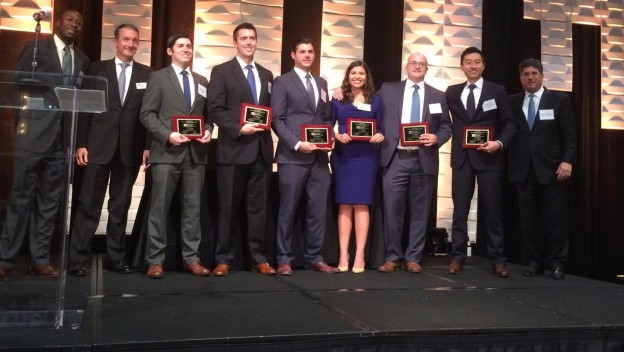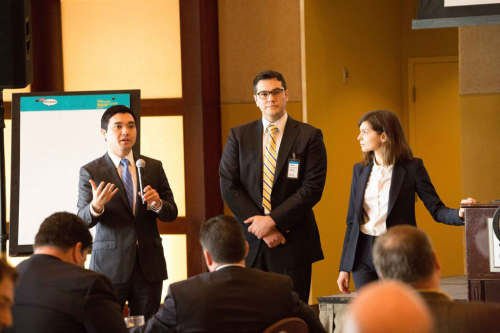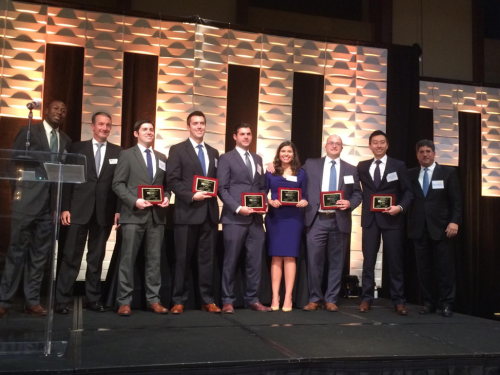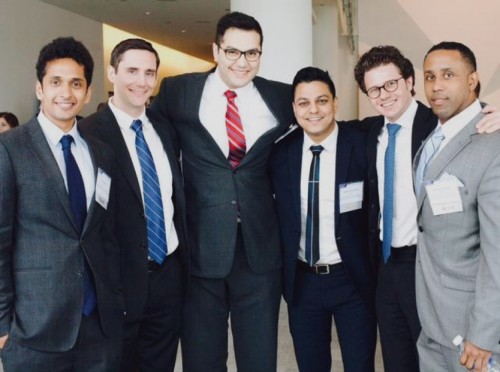
Real Estate is by nature a hands-on business in which real-world experience and new challenges are often the best teacher. With this in mind, graduate real estate programs have embraced case competitions as a way to apply education-based learning to real world project simulation. In recent years, teams from Cornell have stood out in these competitions, consistently finishing strong and forming relationships that they will carry with them over their careers. 2015-2016 was no exception, and we would like to recognize those who represented Real Estate at Cornell so strongly, making decisively positive impressions on all attendees.
The case competitions draw graduate students from all the constituent programs of Real Estate at Cornell, including the Baker Program, Johnson Graduate School of Management, City and Regional Planning, Architecture, and Landscape Architecture. Compared to the preceding five years, 2015-2016 was the strongest year across multiple competitions for Baker Program and other Cornell Real Estate students.
University of Texas at Austin National Real Estate Challenge
The University of Texas at Austin – McCombs School of Business National Real Estate Challenge welcomes teams of real estate and business graduate students to propose an investment thesis from the perspective of an investment fund. Graduate student teams from top business schools compete for the highest honors and cash awards in an invitation-only real estate case competition. Each invited school may enter one team of up to six currently enrolled graduate students. This competition is especially-suited for Cornell real estate graduate students, as more than 50% of Baker Program graduates and several Johnson MBA graduates obtain positions at such real estate investment funds and firms each year.
In the competition, each team must prepare a 20-minute presentation on their solution to the case. The competition takes place in mid-November at The University of Texas at Austin. The 2015 case was prepared by investment managers at competition sponsor Invesco, and involved the re-positioning of two under-performing office assets in two different markets. The Cornell team’s response to the case centered on the potential of creative office conversions as a means of achieving opportunistic returns in the latter stages of the real estate cycle. The team received the case a week prior to the competition and had 72-hours to prepare and submit a response, including a finished slide deck. Once in Texas, they presented their case to a small panel of judges in a closed room before being chosen as one of four competition finalists. A second presentation then occurred in front of the full panel of competition judges, and an audience of students and other real estate professionals. Many of the judges work for firms sponsoring the competition, including Invesco, Lionstone Investments, Alliance Residential, Blackstone, Greystar, and Prudential Real Estate Investors. Competition finalists included Wisconsin (4th), Chicago (3rd), Cornell (2nd), and Texas (1st).
This year’s team was comprised of Jason Henderson (Baker ’16), Benjamin Trussell (Baker/CRP ’16), Ryan Chao (Baker ’16), Matthew Farrell (Baker/MBA ’18) and team captains William Woodworth (MBA ’16) and Annamaria Lookman (Baker ’16). All the participants had high praise for the competition. Ryan Chao reflected that it was the “best experience I had in my two years at Cornell. Working through an actual deal under realistic time pressures and presenting it to industry leaders was the best way to learn how one really needs to perform in our business.”
With a fourth place finish in 2013, third place in 2014, and now second place in 2015, Cornell has a proud history of excelling in this competition. This is a legacy that students in the Baker Program and the other real estate programs at Cornell expect to continue—and improve upon—in the coming years. John Strosser (Baker/MBA ’17) and Matthew Farrell (Baker/MBA ’18) will be captaining the team in 2016.
Members of the 2015 Team take the stage for the award ceremony
2015:
1st Place: University of Texas–Austin
2nd Place: Cornell University
3rd Place: University of Chicago
4th Place: University of Wisconsin–Madison
2014:
1st Place: Columbia University
2nd Place: University of Southern California
3rd Place: Cornell University
4th Place: University of North Carolina–Chapel Hill
2013:
1st Place: University of Southern California
2nd Place: University of Pennsylvania
3rd Place: University of Texas—Austin
4th Place: Cornell University
Alumni Association of the MIT Center for Real Estate: The CASE
In addition to real estate investment, over 30% of a typical Baker Program graduating class are hired by real estate development firms in the U.S. and abroad. The MIT case competition is an annual case that provides current graduate student teams an opportunity to compete, showcase their knowledge, and learn from each other through the analysis of a complex real-world development site. Not surprisingly, Cornell has produced a stellar track record at this competition, with two first place wins in the past four years.
The CASE is organized and hosted by the Alumni Association of the MIT Center for Real Estate (AACRE). Unlike other competitions, the CASE focuses on the process of real estate acquisition and development underwriting at the asset level. The competition mimics the professional circumstances and assignments that students of real estate finance, construction, planning, and design will encounter in the formal development industry after graduation.
In 2016, the case centered on proposing creative and thoughtful developments for nine acres of land in the Port of Miami in Miami, Florida. Cornell finished a strong 3rd place with their proposal for Biscayne Landing, a mixed-use, sustainable, live–work–play sustainable waterfront development. A hotel/apartment hybrid structure would anchor the project, complimented by innovative office and retail space. Highlighted retail tenants included 24-Hour Fitness and Whole Foods’ new 365 grocery store. The Cornell team included Jason Hernandez (B.Arch ’04, MBA ’17), Gen Takahashi (Baker/MBA ’18), Jon Bianco (MBA ’17), and Anastasia Kalugina (Baker/MBA ’17).
Regarding the competition, Hernandez reflected that “the MIT competition was not just an amazing opportunity to delve into and explore a real development site, identify salient issues and propose a unique project. It was also a chance to present viable solutions to industry leaders and get feedback on the quality of our pitch, the feasibility of the idea and the attractiveness of the project.”

Members of the 2016 Team present, from left to right: Gen Takahashi, Jason Hernandez, and Anastasia Kalugina
2016:
1st Place: Georgetown University
2nd Place: University of California, Los Angeles
3rd Place: Cornell University
2015:
1st Place: Cornell University
2nd Place: Massachusetts Institute of Technology
3rd Place: New York University
2014:
1st Place: Georgetown University
2nd Place: Harvard University
3rd Place: Columbia University
2013:
1st Place: Cornell University
2nd Place: Massachusetts Institute of Technology
3rd Place: Georgetown University
Kellogg Competition
Cornell made the semi-finals of The Kellogg Real Estate Conference and Venture Competition on April 27 in Chicago, Illinois. The competition is hosted by the Guthrie Center for Real Estate Research and the Kellogg Innovation and Entrepreneurship Initiative. The Venture Competition showcases MBA students, who have the opportunity to pitch to a high-profile panel of judges. This is a key difference between this competition and the other case-based competitions. The winning team not only receives $100,000 in cash and prizes, but also the opportunity to secure as much as $10,000,000 in equity funding. The primary purpose of the competition is to encourage entrepreneurial real estate ventures, and to promote top student talents before prominent industry professionals.
The Baker Program and Johnson Graduate School of Management were represented by Martin Moser (Baker ’16), Tushar Bundhela (Baker ’17), Tej Reddy (Baker ’17), Harrison Willis (Baker ’17), Robert Lathan (Baker ’17), and Jason Hernandez (B.Arch ’04, MBA ’17).
The team presented an adaptive reuse of a vacant power plant on Panther Island in Fort Worth, Texas. The idea behind the redevelopment was to convert the vacant building into a mixed-use residential (apartments and lofts) and retail project. After being informed that they were one of 14 entries to make the semi-finals, the team traveled to Chicago on April 26 where they presented their case.
From left to right: Tej Reddy, Harrison Willis, Jason Hernandez, Tushar Bundhela, Martin Moser, and Robert Lathan





